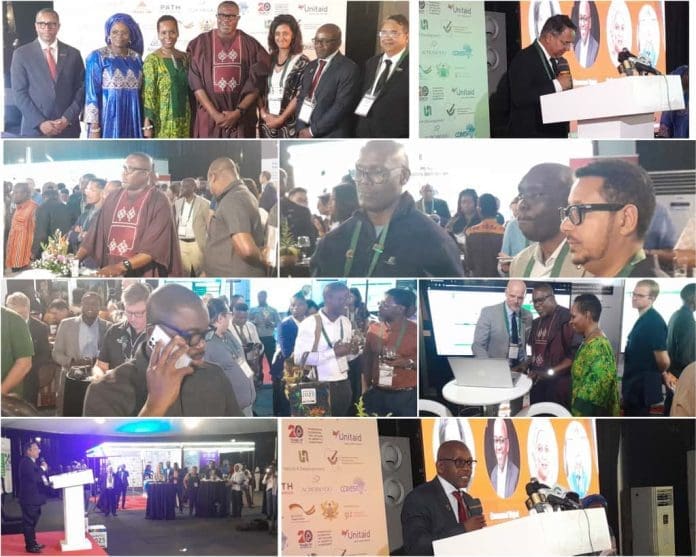Ghana is taking a decisive stand to reclaim its health sovereignty, committing to a sweeping agenda aimed at modernizing its pharmaceutical sector and reducing the continent’s “dangerous” reliance on imported medicines.
The firm declaration was delivered Tuesday at the official launch of the second annual Africa Healthcare Manufacturing Trade Exhibition and Conference (AHMTEC 2025). Policy advisor Samuel Ofosu Ampofu, speaking on behalf of Ghana’s Vice President Professor Jane Naana Opoku-Agyemang, told a gathering of African health leaders, manufacturers, and investors that the nation is poised to become a globally competitive pharmaceutical powerhouse.
The three-day conference, hosted by the Federation of African Pharmaceutical Manufacturers Association (FAPMA), is running from October 7 to 9 at the Labadi Beach Hotel in Accra under the theme: “Collaborate to Compete: Strengthening Partnerships for Sustainable Growth.”
A ‘Call to Destiny’: The 30% Wake-Up Call
Ofosu Ampofu did not mince words when addressing the precarious state of Africa’s health security. He described the theme not merely as a call to discussion but as a “call to destiny,” emphasizing the urgent need to unite capacities and build a self-reliant system.
”We continue to confront the consequences of a fragile global supply chain… and dangerous dependence on imported medicines and essential health commodities,” Ofosu Ampofu said.
He pointed to the stark reality that local manufacturers produce less than 30% of the medicine consumed on the continent, calling this statistic a “wake-up call we cannot afford to ignore.” For too long, he argued, African health security has been at the mercy of others.
”The dependence is not only unsustainable. It is unjust and not right. It is a moral challenge when the health and hope of our people are contingent on the goodwill of external forces,” he stated.
Ghana’s Ambitious Agenda: From Dependency to Dominance
Ghana is determined to change this narrative. Ofosu Ampofu affirmed the government’s commitment, led by President John Dramani Mahama and Vice President Opoku-Agyemang, to implement an ambitious and transformative agenda.
The goal is to reengineer Ghana’s manufacturing sector into a globally competitive powerhouse anchored on value addition, industrial innovation, and regional trade integration. The vision is clear: to make Ghana a preferred destination for high-quality African products, driving jobs, export revenue, and self-sufficiency across the continent.
This policy vision aligns perfectly with the promise of the African Continental Free Trade Area (AfCFTA), whose secretariat is proudly seated in Accra. AfCFTA offers a singular opportunity to build integrated regional value chains, reduce import dependency, and enable African countries to trade what they make and make what they trade.
The government is prioritizing several key areas to achieve this, including:
* Expanding the local pharmaceutical manufacturing base.
* Improving access to finance for the private sector, particularly small and medium-scale manufacturers.
* Providing targeted tax incentives and technological transfer programs.
* Nurturing local innovation and protecting it through strategic procurement and pro-African policies.
Industry Leaders Rally Behind Pan-African Push
The Ghanaian government’s strong commitment was a key reason for Accra being chosen as the host city, following the inaugural event in Tanzania.
Dhananjay Tripathi, CEO of Pharmacology Group, emphasized Ghana’s selection, describing AHMTEC as “more than an exhibition.” He called for a united continental approach to strengthen health security, improve manufacturing capacities, and ensure access to life-saving medicines and vaccines across Africa. Tripathi underscored the collective determination of the diverse participants—including manufacturers, government officials, financiers, and regulators—to transform the continent’s pharmaceutical and vaccine landscape.
Showcasing local capability, Tripathi noted that his company’s sterile production plant in Ningo Pram hosted more than 50 delegates, demonstrating Ghana’s local innovation and preparedness, including for future pandemics. He urged attendees to use the three-day platform to build partnerships and accelerate the push toward self-reliance.
Shifting the Mindset: Embracing ‘Brand Africa’
Echoing the call for a new direction, Dr. Mariatou Tala Jallow, Council Chair of Vizuri Health Dynamics, highlighted the significant growth in continental participation, noting the increase from 30 to over 60 African manufacturers attending the event since its inception.
Dr. Jallow stressed the urgent need for African manufacturers to seize the initiative in industrializing the sector, demanding that they no longer be treated as “cottage industries.”
She called for a fundamental shift in mindset to fully embrace “Brand Africa” and substantially increase the market share of African-made products within the continent. According to Jallow, collaboration is critical. “To collaborate is to recognize that Africa’s strength lies in solidity. When a regulator in Kenya, an investor in South Africa, and a manufacturer in Ghana act as one strategic ecosystem,” the continent can achieve its goals.
The Power of Data: Introducing AMMINA
A major stride toward this unified vision was realized with the launch of the African Manufacturing Market Intelligence and Network Analysis (AMMINA) platform.
Ofosu Ampofu hailed the platform as a tool that represents the “power of intelligence and integration.” AMMINA, which draws from over \mathbf{700} manufacturers and \mathbf{2,500} health products across \mathbf{18} countries, provides real-time, actionable data.
This intelligence gives decision-makers the visibility needed “to move from aspiration to action,” helping governments, investors, and manufacturers identify opportunities, close gaps, and accelerate investment in critical health manufacturing capacity.
Conclusion: Architects of Sovereignty
In closing the official launch, Ofosu Ampofu declared AHMTEC 2025 officially open, commending FAPMA and its partners for their dedication to building a self-sufficient pharmaceutical sector.
”You represent the architect of Africa’s industrial and health sovereignty,” he told the delegates. “Let us together make the 30% figure a relic of the past and commit to a future where Africa manufactures the medicine it needs, sustains the jobs it creates, and secures the health of its people with pride and independence.”
The message from Accra is clear: The case for African health manufacturing is not just urgent—it is a cornerstone of a new era of industrial strength, dignity, and economic freedom for the continent. The partnerships forged at AHMTEC 2025 are positioned to redefine Africa’s health future for years to come.
By Kingsley Asiedu
Source: newsghana.com.gh











